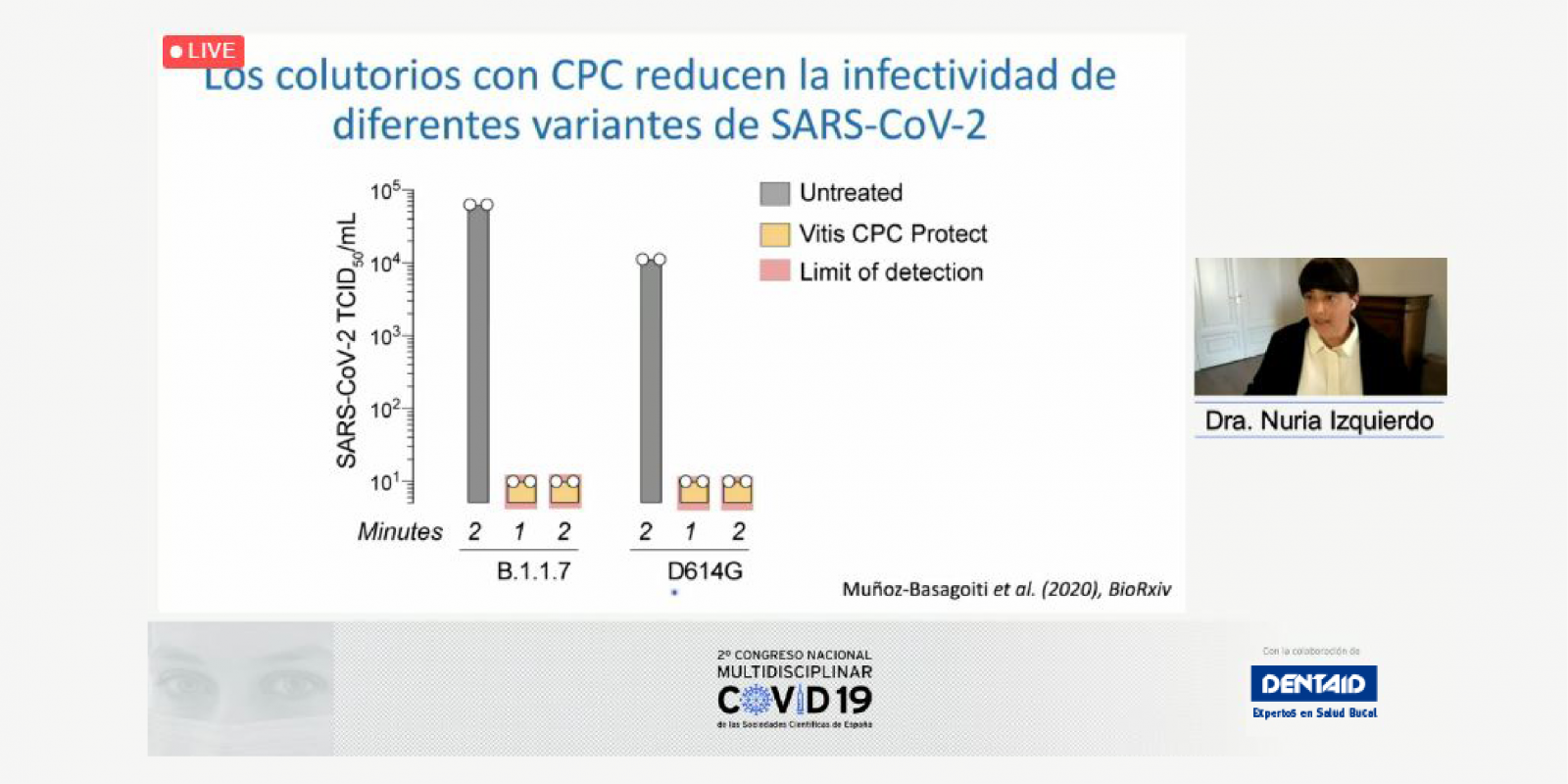DENTAID Oral Health
News for pharmacy professionals
THE PHARMACY, A VITAL LINK FOR IMPROVING ORAL AND DENTAL HEALTH
27 Feb 2017

As health professionals, pharmacists are key figures in the interdisciplinary health teams that work together monitoring and caring for people with diseases. In the case of oral health, their proximity and accessibility often make them the first professional to whom many patients turn when they need to clarify certain doubts about bleeding gums, sensitivity to heat and cold, dry mouth or halitosis. Hence the importance of their proper training in these areas and the need to foster a close tie with the dental clinic.
Many people walk into the
pharmacy with gum complaints that may lead the pharmacist to suspect gingivitis
or periodontitis. Bleeding gums, bad breath, extreme tooth sensitivity, tooth
mobility, changes in tooth position or the presence of an abscess or phlegmon
may indicate the existence of periodontitis, an inflammatory disease that
destroys the bone supporting the teeth until they fall out and which poses an
additional risk to overall health by increasing the possibility of heart
attack, stroke, respiratory disease or preterm birth, and hinder the control of
diabetes.
“Pharmacists play an essential
role to improve the early diagnosis and prevention of gum disease, as well as
to collaborate with dentists in monitoring its evolution,” says periodontist
Dr. Neus Carrió, a lecturer in the Periodontics Master’s Degree programme at
the International University of Catalonia, who has collaborated with the
Spanish Society of Periodontics and Osseointegration (SEPA).
In fact, the first piece of
advice on health is often given at the pharmacy. That is why, according to
former SEPA chair Dr. Núria Vallcorba, “pharmacists and their teams are
essential for providing information about gum disease, and its prevention and
treatment”. In her view, “they are exceptional information points, because of
the confidence people have in them, because of their qualifications, and
because they are widely distributed geographically.”
ESSENTIAL ROLE IN PREVENTION
The prevention of oral disease
is necessary to keep teeth nice and healthy and chewing effective, and it is
fundamental for good general health; of all good habits for health, effective,
regular oral hygiene is key. From this perspective, Dr. Carrió considers that
“the propagation of healthy hygiene habits by pharmacists is decisive.”
Dr. Carrió maintains these
professionals “can advise on the best resources available to promote
periodontal prophylaxis. Pharmacists can offer their customers information
about different forms of gum disease and encourage them to seek the necessary
dental examinations.”
There is currently a wide
variety of products available on the market that help prevent periodontal
diseases. Pharmacists are very familiar with oral hygiene products: brushes
with soft or medium bristle hardness, small heads to reach rear quadrants;
interproximal brushes of different sizes depending on the space between teeth;
dental floss and tape; toothpastes or mouthwashes that supply ingredients such
as fluoride for cavities or contain components to reduce hypersensitivity,
inflammation, or dental stains, to prevent bad breath, etc. But beyond advising
on the most appropriate product for each customer, the pharmacist’s
recommendation on the need to brush twice a day and have two check-ups a year
with the dentist or periodontist is fundamental.
In addition, the therapeutic
care given by pharmacy professionals can help with the detection of factors
associated with periodontal disease, and besides dispensing the right product,
if they suspect that the patient may have periodontal problems, they should
recommend a visit to the dentist.
PHARMACISTS AND DENTISTS, WORKING AS A TEAM
Pharmacists have a prominent
role in health care. Like other medical specialists, such as cardiologists,
endocrinologists or gynaecologists, pharmacists are healthcare professionals
who may suspect if a person presents periodontal problems and can recommend a
timely visit to the dentist.
As an example, Dr. Carrió
states that “if a person comes to the pharmacy because their gums bleed,
besides dispensing an oral cleansing product, the pharmacist should be aware
that gingival bleeding implies a disease that must be properly diagnosed and
that has to be treated by a periodontist.”
Hence the importance of
organising informative lectures to establish greater communication between
pharmacists and periodontists. Along these lines, Dr. Carrió also proposes
“establishing certain gum care recommendations for those who visit the
pharmacy, since the pharmacy becomes an essential information point for the
patient; and additionally, they can assess whether customers are complying with
daily oral care recommendations, if they are getting their recommended dental
check-ups and if they present problems with their gums (including bleeding when
brushing or red or swollen gums).”
IMPROVING THE PHARMACIST’S TRAINING
Since there has been major
progress relating to our knowledge about oral health and there are more and
more oral health products on the market, pharmacy professionals need constant
training, and dentists and periodontists must help them with that.
“Pharmacists and dentists form
a team to secure the best oral health for everyone,” says Dr. Vallcorba.
Pharmacists should receive specific up-to-date training from dentists, and
likewise, dentists should assist pharmacists by recommending that they dispense
products whose efficacy has been scientifically proven, while explaining the
difference between the diverse products on the market to their customers.
Customers generally recognise
and appreciate that pharmacists do not just sell products, but know them well,
know what they are used for, when and how, so they feel guided in the use of
the product they have purchased.
DIABETICS AND PREGNANT WOMEN, TARGET POPULATIONS
Although the pharmacist’s work
in oral health care covers the entire population, there are at least two groups
where their role may be especially relevant: people with diabetes and pregnant
women.
It is important for
pharmacists to know that periodontal disease is more common and progresses more
quickly in poorly controlled diabetics. Diabetes is a risk factor for
periodontitis, and diabetics are two to three times more likely than
non-diabetics to suffer periodontitis. Diabetics also tend to have an increased
number of deep pockets and increased bone loss. In addition, there is an
association between the duration of diabetes and the risk of onset of
periodontitis, and a dose-response relationship between poorer metabolic
control of diabetes and the severity of periodontitis.
“If diabetic patients do not
take proper daily care, they should be reminded that this forms part of their
control of diabetes, and the importance of regular dental check-ups should be
stressed,” says Dr. Carrió, who points out that “the education of those who
have diabetes should include the implications of their condition - especially
if poorly controlled - on periodontal disease.”
Dr. Vallcorba specifies that
pregnant women “should be instructed as early on as possible (ideally, before
becoming pregnant) on proper oral hygiene techniques, including interdental
hygiene, which should be performed daily as a routine.” If a pregnant woman is
suspected of having periodontal problems, she should be referred to a
periodontist, especially since poor periodontal health is known to potentially
be a risk factor for preterm birth and low birth weight babies. Therefore, “a
pregnant woman should be treated for her periodontal problem, or her condition
should be properly prevented, before and during pregnancy, particularly in the
second trimester,” advises Dr. Vallcorba.
RELATED ARTICLES

07 Oct 2021
Warding off the smoke from the dental clinic
Kicking the smoking habit is the best thing a smoker can do for their present and future health, gaining in quantity and quality of life. The task is…

21 May 2021
Deciphering the role of oral health and hygiene during COVID-19
The mouth is one of the main paths of entry into the body for many microorganisms that can multiply and cause infections in both the mouth itself and…

12 Apr 2021
10 things you need to know about diabetes and periodontitis
It has been found in recent years that the link between periodontitis and diabetes is bidirectional. While diabetes increases the risk of periodontal…
Sign up for the DENTAID Oral Health newsletter
Sign up for the newsletter